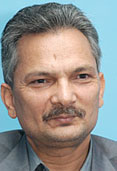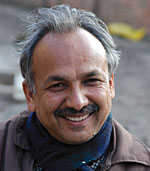 |
 |
At the Nepali Times, we took Fridays easy after the paper came out. That morning's edition featured the unending political bickering in a country paralysed by strikes. Then, as now, it was the NC and UML jostling for advantage with the Maoists on the other side.
Given what was to follow that night, the editorial was eerily titled 'God Save the King' and critiqued the Maoist campaign to ban the national anthem in schools.
In the From the Nepali Press section on p 15 was a translated article by Kishore Nepal from Naya Sadak, titled 'A Suitable Prince'. The Crown Prince was now 31, and needed to get married, Nepal wrote, hinting at disagreement within the royal family about Dipendra's choice of bride, a factor in the tragedy that was soon about to unfold. Royal matters were not discussed so openly in those days, and an article like that was fairly rare.
The first phone call came at 9:30 pm from a friend asking if I had heard that the king had a heart attack and was in hospital. King Birendra had heart problems, so this was plausible. People in Lazimpat had heard gunshots, and rumours spread that the Maoists had attacked the palace. Cell phones had been introduced just two years previously, and they started going off all over town. Hospital personnel started calling friends and relatives, they in turn called others.
Like Chinese whispers, lot of the information got distorted as it spread. But the broad outlines of the ghastly events began to take shape as the night wore on. The story that emerged was so shocking and unbelievable that many rejected it as gossip and went to sleep. But the phones didn't stop ringing. 'King Birendra dead, Queen Aiswarya dead, Princess Shruti wounded, Prince Nirajan dead, Crown Prince Dipendra in coma' the SMSs read. At 11 pm, three hours after the shooting, we had to decide whether to put the news up online. We hesitated. What if all the sources we heard from had all got it from the same rumour?
The storm was closing in, and mixed with the thunder was the sound of a helicopter overhead. This was the royal Super Puma that had tried to fly out to Pokhara to fetch Prince Gyanendra turning back because of bad weather. At 1:30 AM we put up the first item of news up on our website relating what we knew till then: that at least six members of the royal family were dead, there were rumours the crown prince had shot everyone and then shot himself.
 "I stick by what I said about the massacre ten years ago. Without a well-planned political conspiracy, the whole family of King Birendra could not have been wiped out while Gyanendra's family remained unharmed. The country has now become a democratic republic and we should dare to appoint a powerful enquiry commission to unravel the truth behind the massacre." Baburam Bhattarai |
 "As an editor, I don't regret giving space to a differing opinion. The arrest was proposed by Ram Chandra Poudel, the PM's office endorsed it and it was later defended by Chakra Bastola in front of the international media in Delhi. Nobody in the government opposed it. Girija Prasad Koirala, then PM had sent word to Kailash Sirohiya and Binod Gyawali, in detention that cases against them would be withdrawn if I was removed from my post but they refused." Yubaraj Ghimire |
By morning at Chhauni Hospital seven members of the royal family were dead, King Birendra's brother Dhirendra was struggling for life and Dipendra was in a coma. The helicopter with Gyanendra finally made it and landed at the hospital. Rules of royal succession meant that Dipendra was declared king even though he was brain dead.
The government was in disarray, no one knew who was in charge: the prime minister, the palace, the comatose king or Gyanendra? An official announcement finally came in the afternoon of 2 June that said King Birendra and Queen Aiswarya were dead, it didn't say how they died. It proclaimed Dipendra king, and Gyanendra regent. A senior palace official told CNN that the royal family was killed by the "accidental discharge of an automatic weapon". An information blackout and statements like that meant rumours ran rife, media mishandling lead to wild conspiracy theories.
After Dipendra's funeral, Gyanendra was named king and he addressed the nation on television promising the people a "thorough investigation". Nepal had three kings in four days. The funerals and Gyanendra's enthronement happened as protests raged through the capital despite curfews.
The probe team finally came out with its preliminary findings two weeks later, saying Dipendra was responsible. But the people, lied to and denied correct information, didn't believe the government when it finally told the truth.
See also:
Issue #45
Issue #46
Issue #47
"The New Kot Massacre"
| |
Ever since the Sugauli Treaty of 1846, all the political changes that have taken place in Nepal have been orchestrated by first British and then Indian imperialists. The new 'Kot Massacre' that transpired in Narayanhiti is another episode in this series. Why were King Birendra and his family killed at this time? Even during the Indian embargo and the subsequent revolt in 1990, King Birendra had preferred to bow down to the people's wishes than give in to foreign pressures, and lately he had refused to mobilise the army against the Maoists. This was possibly his biggest fault in the eyes of the Indian and American expansionists. In many national issues, we and the king had similar views leading us to have an undeclared working solidarity, a fact that had alarmed imperialist powers.
King Birendra's softer stance towards the Maoists and the growing closeness to China did not endear him to India and America. The old Indian dream of turning Nepal into Sikkim now turned into another grand design whereby Nepal would be Bhutanised before it could be made into another Sikkim. RAW (Research an Analysis Wing) formulated a strategy for this design in consultation with the CIA (through FBI whose branch was opened in Delhi). RAW infiltrated into the palace by generating a false fear of ISI and chose the new 'Jigme Singye' for the Bhutanisation of Nepal. It was through this 'Jigme Singye' that another Kot massacre was enacted in the palace. There is no doubt now that RAW which had already found a 'Lendup Dorje' in the form of Girija had used the new alliance between 'Lendup Dorje' and 'Jigme Singye' to enable the Bhutanisation and ultimately the Sikkimisation of Nepal as per its larger strategy.
But this is 2001, not 1846, and a lot of blood and water has flown down Nepal's rivers. King Birendra's and Prithvi Narayan Shah's contribution to the nation would always be remembered by the Nepali people but in no way would they accept the emergence of the new 'Jigme Singye' . The army which was unable to save the King should now work to save the nation and refuse to serve the puppets of imperialism in the palace. The country is in a grave condition; all patriotic forces should join hands at this moment.
Read also:
Dipendra kicked his father after he shot him, KETAKI CHESTER
Dipendra's troubled childhood


